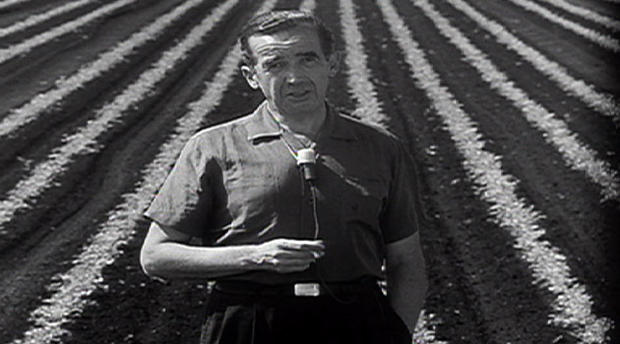"Harvest of Shame" Still Matters 50 Years Later
By CBS News chief national correspondent Byron Pitts
This week marks the 50th anniversary of Edward R. Murrow's award-winning documentary "Harvest of Shame."
The hour-long special aired in 1960, on the day after Thanksgiving. It was a shocking look at the deplorable living and working conditions for America's two to three million migrant farm workers. "The best fed people in the world," as Murrow put it, gathered around the television set and watched (in black and white film) the lives of the people who picked the fruits and vegetables that fed the country.
CBS REPORTS "Harvest of Shame"
Fifty years later, we wanted to see what had changed for America's migrant farm workers. Here's some of what we noticed right away. In 1960 most migrant farm workers in the United States were poor whites and poor blacks. Today they're mostly poor Hispanics. More farming is done by machines today than back then, so there are fewer jobs. Migrant farm workers barely made enough to feed themselves or their families. Their diets were deplorable. Not much has changed on that front today. Migrant farm workers do make a bit more. It's still hard to make ends meet. Their diet is still short of what most would consider "healthy."
In 1960, Murrow had a phenomenal producer team. That's one thing that hasn't changed at CBS News. For this story I worked with my long-time partners: Betty Chin and Rodney Comrie. They actually tracked down a few people who were in the original documentary. They were small children back then. I wish I could say the lives of those children are dramatically better today - but they're not. They're all well over the age of 50 now, and they work in farming or some other blue-collar profession. Betty and Rodney did all they could to have the family members talk with us. They declined and we've respectfully left them alone. An in-law told me "the family would like to keep the past in the past. Those were painful times. There are bitter memories."
Today it would seem there are new generations who bend over in fields under a hot sun now gathering our nation's fruit and vegetables and collecting their own "bitter memories."
Juan Lopez, 62, was one of the migrant workers we interviewed for this story. He showed me his hands. They looked like the hands of an aging boxer - swollen knuckles, twisted fingers and old scars. With those hands he's literally scratched at the earth to make a living for himself, his wife and their five children. His kids now work in the fields. They live in a small trailer. You've heard the saying, "the place was so clean you could eat off the floor?" That saying applies to that man and his home.
At 5 a.m. one recent Saturday morning, we watched as nearly 150 men and women started gathering, hoping to be picked as day laborers. They're part of what's called "the migrant stream" - workers who start the year in Florida and make their way north and west to pick fruit and vegetables.
I've seen plenty in my years at CBS News. But the scene was striking. We were not far from Ft. Myers, Florida - one of the great American cities. And this predawn setting looked like a gathering a in third-world country.
Something we also saw -- that probably won't translate well on video -- is both the level of desperation and pride in the eyes of many of the people we met. They're desperate for obvious reasons. The pride though was what really struck me. These people maintained their dignity because they were working for what they wanted. None of them showed up asking for anything but a chance to work. And it's the kind of work most Americans would refuse to do.
But, back to that sense of pride for a moment, and desperation. In recent months, I've seen it more and more in the eyes of middle-class Americans - men and women who also know the value and pride of hard work. People who've lost their jobs and now their savings have either run low or run out.
Standing in that dusty parking lot before sunrise it seemed at that moment that there was little that truly separated those migrant workers and more and more middle-class American families.
I hope you watch our "Harvest of Shame" report. I also hope that on this Thanksgiving holiday, that those of us who are lucky enough to celebrate a meal with our loved ones can take a moment and remember those less fortunate.
Fifty years later, "Harvest of Shame" seems as relevant today as it was then. Today, the struggle in of the fields has spread to many parts of suburbia and urban America.
I hope when the next generation of CBS News journalists revisit "Harvest of Shame" 50 years from now, it will be as one migrant worker told us - "a harvest of hope."
